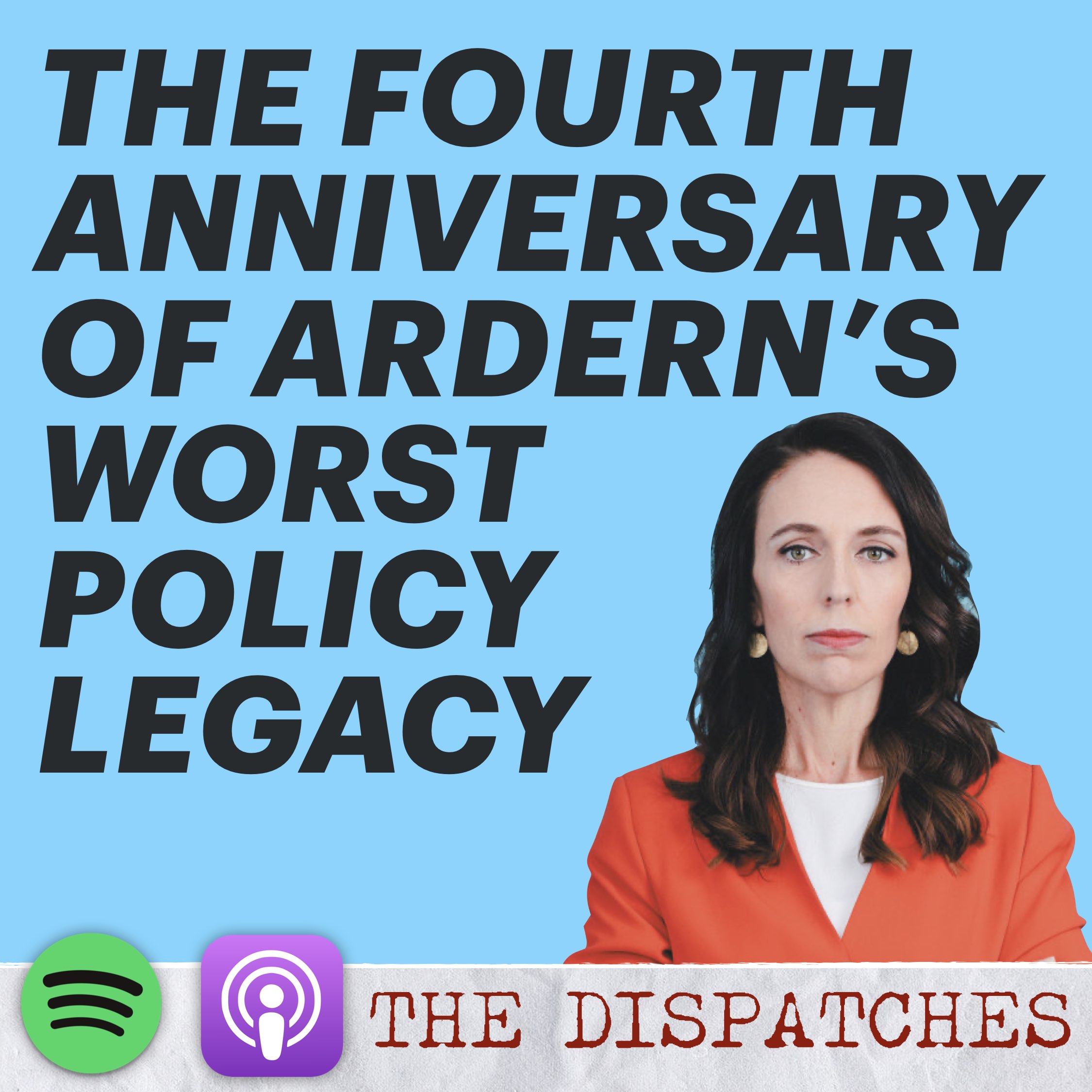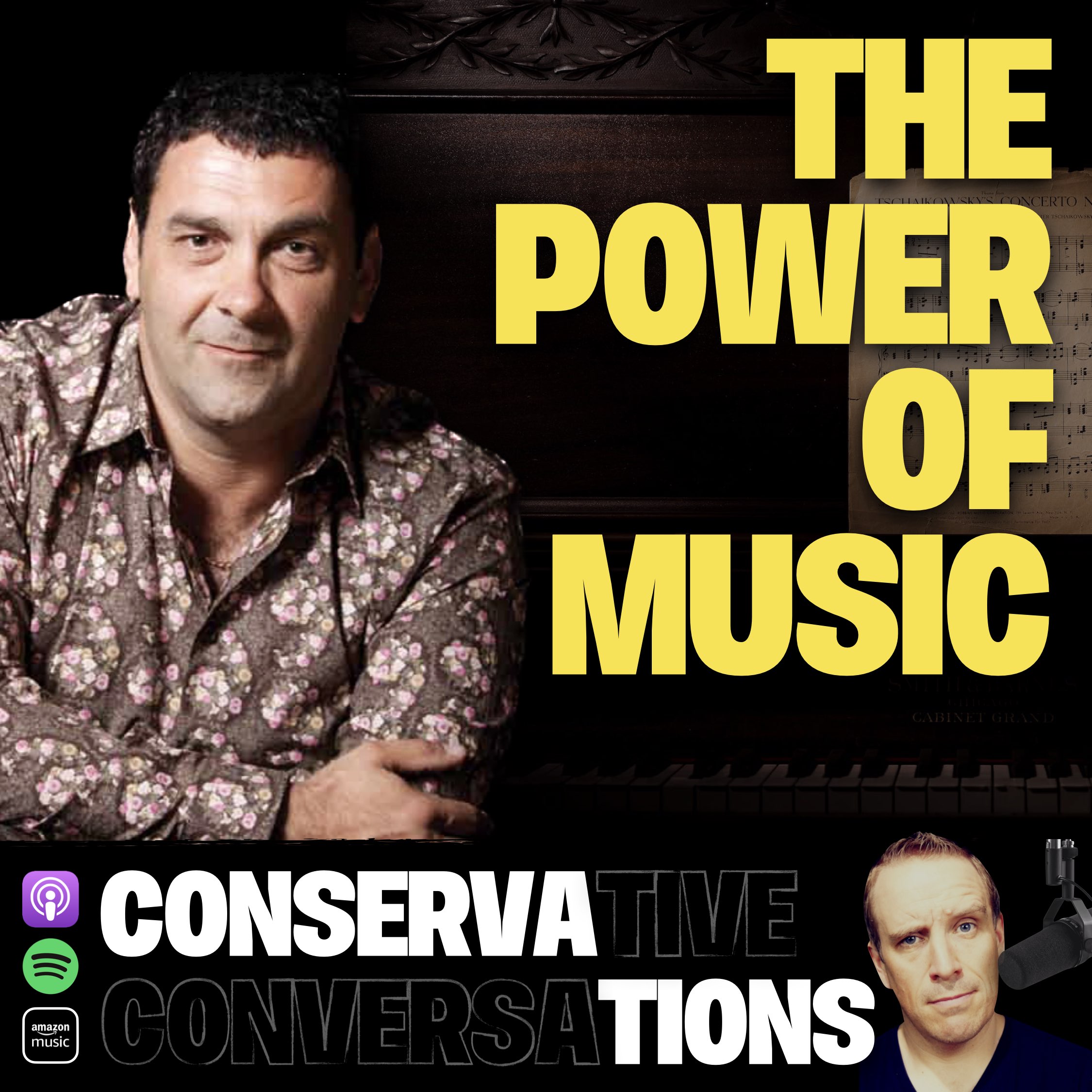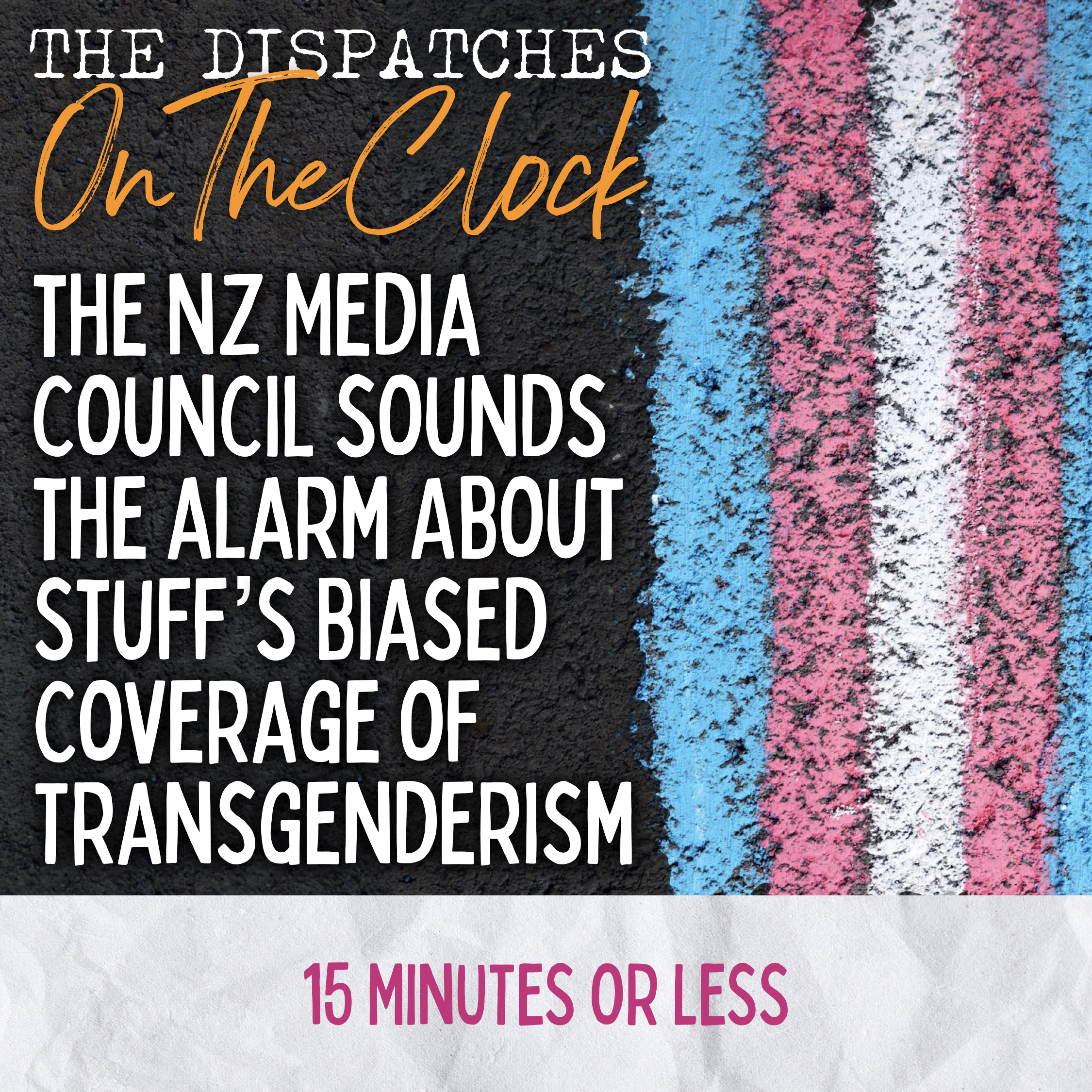[00:00:04] Hi, my name is Brendan Malone, and you're listening to the dispatches, the podcast that strives to cut through all the noise in order to challenge the popular narratives of the day with some good old fashioned contrarian thinking. You might not always agree, but at least you'll be taking a deeper look at the world around you.
[00:00:22] Hi, everybody. Welcome along to the, well, I was going to say Friday Freebie episode of the Dispatchers podcast, but it's not actually Friday, it's Thursday. Today we're publishing the free to air episode a day early because tomorrow's Good Friday. So let's call it the thrifty Thursday Freebie episode of the Dispatches podcast, our weekly free to air podcast. If you are new here and you like the content, why not subscribe? If you are able to and your platform allows you to do this, and you have been enjoying these episodes, then please give the show some stars and a bit of a rating. All of that really, really helps the podcast. Last but not least, if you want a daily episode Monday to Friday of the Dispatchers podcast, we publish one every single day for all of our $5 monthly patrons. So just go to patreon.com leftfootmedia, the link is in the show notes, and become a five dollar monthly patron to get access to an episode of the Dispatches podcast every single day of the week. Right, let's jump into today's topic of conversation, the absurdly hilarious, outrageous over a politician and a pop song. And for those who don't know what I am talking about here, I'm talking about this incident that really is, I think, largely media generated outrage and absurdity. But it started when the media started making a big deal out of the fact. And I have a funny feeling this actually might have started on Twitter. It's one of those kind of media stories where a desperate journalist, proving that we just have far too many journalists for the actual amount of news we have in this country, went trolling on Twitter looking for a story to write and found someone complaining about the fact that the new Zealand first political party led by Winston Peters was regularly using the song tub thumping by british pop band. And I know they call themselves a punk band, but come on, they're more of a pop band. Chumba Wumba in their political rallies and public appearances. And you can sort of see why. Because Winston Peters was a man who has a couple of times really come back from the outer edges of politics. He's been in parliament, then he gets booted out, and then he comes all the way back again and he's done this a couple of times. And here he is back after people really did probably previously say, oh, it's all over for him. And he's like, no, I'm back. I get knocked down, but I get up again. So it sort of makes sense why he'd be using this song. But anyway, this media manufactured outrage was kicked up about the song and it went all the way back to the band themself in the UK. And I'm not sure if they're still performing or whether they've sort of retired to become angry, curmudgeonly old former musicians. I don't know what they're doing, but I know that they then said, we are sending you a cease and desist. Stop using our song. We don't want these evil right wing fascists using our music, which is just laughable. If you know anything about Winston Peters, we'll get to that in just a second. And it got to the point where Boff Whaley. I think that's how you pronounce his name. He was the. I think he's the former frontman, wasn't he? But he was in Chumbawamba and he wrote an op ed that was published in the Guardian, of all places, and he had a few choice words to say, and this is what he said. And by the way, he starts this by talking about what he calls universal songs. You know, these songs that just have universal appeal to anybody and everybody, and when they're going through all sorts of situations in life, they just really resonate with a particular song. And so he puts his song tub thumping feely and squarely in that category. But then he goes on to say this, but there's a problem with these universal songs. They can be hijacked by people who clearly don't understand the spirit in which they were written and want to use them to aggrandize themselves or to sell ideas that aren't universal at all. It's like baking a cake and declaring to the room, here, have a slice. The cake is for all of us. And some greedy b a s t a r d grabs five or six slices and scurries off into a dark corner, sniggering. And to stretch that analogy, the greedy b a S T a R d is the person that noticeably never turns up with his own cake for everyone to share. That analogy has nothing to do with Winston Peters or politics. Honestly, it's a pretty weak metaphor for what he's trying to say here, because that's the thing with songs, with literature. With art, theatre, cinema, with most of the beautiful creative, cultural things we love, they are very rarely created by those on the political right. The bigots don't have any good songs of their own. Now, just remember that point, because we'll come back to it because it is just so laughably hilarious. Which brings me to New Zealand's deputy prime minister, Winston Peters, and his use of tub thumping. The man is clearly modeling himself on the recent upsurge of populist politicians.
[00:05:20] Can I just correct the record and say that before the recent arrival of Mister Trump and other populist politicians on the world scene, there was Winston Peters? So if anything, those people are modelling themselves on him. And it is quite believable considering the fact that previously he was the foreign minister. So maybe, just maybe, he's had a bigger influence on world politics than we actually realize. These ultra wealthy men. Well, that's not really Winston Peters somehow getting to claim to be of the people across the globe, from Italy to Sweden, from Bolsonaro to Trump, these self styled outsiders are gaining power and popularity using slogans that appeal to ordinary people. Slogans that make no sense when you put them in the mouths of millionaire careerists. Their rhetoric is anti elite, and yet they clearly and definably are the elite. Their popularity. This is. It's so funny because this man's riding in the Guardian.
[00:06:20] Their popularity depends upon them playing at being just like you and me, the good guy at the bar, who buys you a drink while you're watching the football, who tells you the reason the country is going down the drain isn't because of the multi billionaire corporate hoarding of the world's wealth, but because q a cultural warrior, rant about immigration and snowflakes and experts and I did my own research. Oh, lovely.
[00:06:47] This man isn't bigoted at all. Let me be clear. The song tub thumping was written to celebrate the resilience and tenacity of working class folk who keep fighting when the chips are down. It has nothing whatsoever in common with wealthy politicians with extremist, anti liberal agendas. Oh, that's hilarious. Like, the liberal agenda is actually pro working class. The liberal ideology gave us this massive corporate bloomin monolith that dominates our landscape and it gave us the situation of the managerialism and the bureaucracy, which does so much toxic harm to the working class. It's just laughably nonsensical. But anyway, here is why I think this whole situation is so absurd and, but let's be clear again, this is media manufactured outrage at its finest. Or you might say, at its worst, depending on which way you are looking at this. Firstly, the idea that the left represents the pinnacle of modern artistic creation is pure comedy. When you look at what is going on right now, particularly if you look at, for example, say, Hollywood and what is happening in movies, and then you look at television and how so much of progressive ideology has completely destroyed any artistic merit that was there previously, it's just turned it into hollow, vacuous political propagandization. They don't care about art. They declare that they are here to preach you a message. They are not producing good art. And if you go back through history too, I'm pretty sure that he would probably count particular and truly great artists who were absolutely christian and conservative in their view as being bigots according to his modern liberal mindset. But some of the most beautiful art in the world was created by them. Secondly, the idea that the left represents the working class is about as parsee as the song tub thumping is. It really is. The left has not represented the working class in a long time. They just have not. They have become the hotbed and the home of progressive ideologies and fringe ideas that are hugely destructive to family life, to local community.
[00:09:03] They are the promoters of increasing overreach of the state because they are promoters of an ever growing motherly state with an ever increasing bureaucracy and all of the many other things that do great harm to the working class, which exists solely because of the fundamental community, the first and most important of all communities which they do so much devastation to, and that is the family.
[00:09:30] And by the way, New Zealand first is absolutely not some sort of right wing anti working class elite party. They have absolutely been the one party that has consistently, even if you don't like their policies, they have been the one party that has consistently advocated for working class kiwis, and that includes working class Kiwis who are now retired. And they have become the only party to actually consistently maintain this commitment over the past decade when all of the other major political parties have just completely fallen off the wagon, drunk with power and ideology and everything else. New Zealand at first has been the one party that has maintained its consistency in actually advocating for those fundamental working class values that so much of our country really, I guess, prides itself on and in many ways was actually built on. Thirdly, the notion that tub thumping was ever seriously considered a quote unquote working class anthem is just laughable. That's why I read that particular paragraph with a bit of dramatic flair in my voice, because it's just absurd. And grandiose nonsense. This song always was and forever will be a bubblegum pop earworm, which is why I had a chuckle when I hear people referring to them as a punk band. They're not famous for anything punk they did. They're famous because of a bubblegum pop earworm that they wrote a radio and dance floor hit that didn't actually seem to really have much of a coherent lyrical message of any sort. I mean, that's one of the reasons why bubblegum pop earworms actually tend to work, because they are just generically bland and anybody can sort of read anything into them they want because it's not really so much about what's being sung. It's more about the melodic hook that you enjoy tapping your feet to. I remember the release of this song. In fact, I had my own dj business at the time, and I was forever playing this song at gigs that had nothing whatsoever to do with working class people. This was never, ever considered a working class anthem. In fact, I also had a band, and we used to play covers gigs, and we played this song again. Not once did I ever look at it and think, oh, yeah, this is a working class anthem. In fact, if you take a close look at the lyrics, it actually reads more like a song that is ridiculing someone or something, and it actually even looks like it might be ridiculing someone based on their class. It doesn't really sound like it's at all particularly pro working class. Have a listen to this. I get knocked down? But I get up again? You're never gonna keep me down? I get knocked down but I get up again? You're never gonna keep me down? I get knocked down but I get up again? You're never gonna keep me down? Wait for it. You know where this is going. I get knocked down but I get up again? You're never gonna keep me down? Is there more to this song, Brendan? I hear you say, well, yes, there is. Just wait for it. And this is the interesting bit that does sound a little bit more like ridicule. He drinks a whiskey drink, he drinks a vodka drink? He drinks a lager drink? He drinks a cider drink? He sings the songs that remind him of the good times? He sings the songs that remind him of the better times? Oh, Danny boy, danny boy, danny boy? I get knocked down? But I get up again? You're never gonna keep me down? I get knocked down, but I get up again? You get the gist. And then it goes on to say this. He drinks a whiskey drink. He drinks a vodka drink, drinks a lager drink, he drinks a cider drink. I'm just laughing at the comedic, repetitive nature of the song after being told that this is supposedly some great, universal working class anthem. He sings the songs that remind him of the good times. He sings the songs that remind him of the better times. Don't cry for me next door neighbour and I've read plenty of commentary. This is well before this controversy, where people pointed out that the reason they probably wrote that line the way they did don't cry for me next door neighbour was because they wanted to avoid being sued for copyright for stealing other people's lyrics from the song. Of course, don't cry for me, Argentina. Oh, the irony. I get knocked down but I get up. You get the gist. I'm not gonna reread that. And then we end up by saying, I get knocked down. We'll be singing but I get up again, you're never gonna keep me down when we're winning. I get knocked down, we'll be singing but I get up again, you're never going to keep me down. So, yeah, that's a very compressed version, but that's the extent of the lyrical content of this song. A, that is not a working class anthem and b, that actually sounds suspiciously like a song that is written about a man who is out drinking and it's more of a sort of ridiculing, or you might say a light hearted take on a guy who, you know, are you not going to stop me from drinking the place dry, mate? I get knocked down, as in, I fall down drunk and then I get back up again. It doesn't really sound like a pro working class song to me. There is nothing in the song that inherently says, yes, this is an anthem of the working class and that's why it was never considered an anthem of the working class. This is absolutely grandiose to say that this song has ever been seen as anything more than a bubblegum pop earworm that just gets caught in your ear and you're like, oh, I can't get that tune out of my head. Once you hear it, it doesn't go away. And that's why the melodic hook was why this song was so popular. It wasn't popular because people said, you know what? The song really speaks to my soul and my struggles in life.
[00:15:14] It reminds people of the time they went to a nightclub or a wedding or a 21st or whatever it was, and they were drinking and dancing. That's what this song is. It really is quite funny. And finally, here's the most hilarious thing of all about this manufactured outrage. Just a couple of years ago, Chumbawamba, the great bastions and champions of the working class, and as we've heard here from Boff Whaley himself, the anti corporate fighters of the free man that they like to proclaim themselves to be, they actually allowed this very same song, tub thumping, to be used in a corporate commercial by a big corporation during the Super bowl.
[00:16:05] Oh, the irony. Those Super bowl commercials cost a lot of money, but apparently, no, they're fighting for you, the little guy. That's why they're licensing this song to corporate commercials, because they're really not the elites that they're men of the people.
[00:16:25] Oh, it's just gold. This incident, basically, I think, is the political equivalent of the kid who grabs his ball and storms off from the playground during the game and angrily announces to everybody, this is my ball and I'm leaving. Basically because he doesn't like the fact that the other side is winning. He thought he'd win all the time, and he's not winning anymore. And so he runs off in a half. That's what this is. This is the political equivalent of that kind of playground episode. Now, let's also be clear about this. This is revolutionary activism because these people, these self styled universalist artists who actually are little more than political agitators, they only police those that they politically disagree with. So when people who agree with them use their songs, oh, great, you're allowed to. These supposedly universal anthems that we've heard so much about in this Guardian article are actually not that universal at all. Apparently, only certain people of certain political flavors are allowed to use them. So basically what they're trying to do is they're trying to have their cake and eat it, too. This is art, apparently, but it's only for people with specific political beliefs, the beliefs regarding politics that I happen to hold. So that means it's not art at all. It's not about beauty, it's not about goodness, it's not about truth. It's actually about political propagandizing.
[00:17:44] And like I said, this is revolutionary activism. They only police those that they politically disagree with. They don't police their own. They don't say to people that they agree with politically, oh, it's not okay for you to use my song because this is politics. And my song is a universal piece of art. In fact, I'm responsible for producing some of the greatest art the world has ever known. And you know what? My art would be even more perfect if I wasn't so humble.
[00:18:07] But yeah, they don't do that. They only police the people that they disagree with politically. It's political revolutionary activism. The best response to all of this, by the way, happened when Winston Peters trolled the New Zealand political journalists by walking through that packed media gallery area in parliament. And he had the song tub thumping playing on his phone, and he had it up loud and walked past the media playing the song. Ah, that was a beautiful, beautiful moment. What an absurdity. By the way, if you're listening to this, and it is maundy Thursday, Holy Thursday, you haven't entered Good Friday yet. I pray that you have a really joyful and blessed and meaningful celebration of the Easter mysteries. And if you are listening to this, and Easter has gone already, Sunday has been and gone, then happy Easter to you. In fact, I might even say a top of the resurrection morning to you and your family. Thanks for listening. God bless you all. And don't forget, live by goodness, truth and beauty, not by lies. And I'll see you next time on the dispatches.
[00:19:21] The Dispatchers podcast is a production of Leftfoot Media. If you enjoyed this show, then please help us to ensure that more of this great content keeps keeps getting made by becoming a patron of our
[email protected].
[00:19:34] LeftfootMedia link in the show notes thanks for listening. See you next time on the dispatches.






